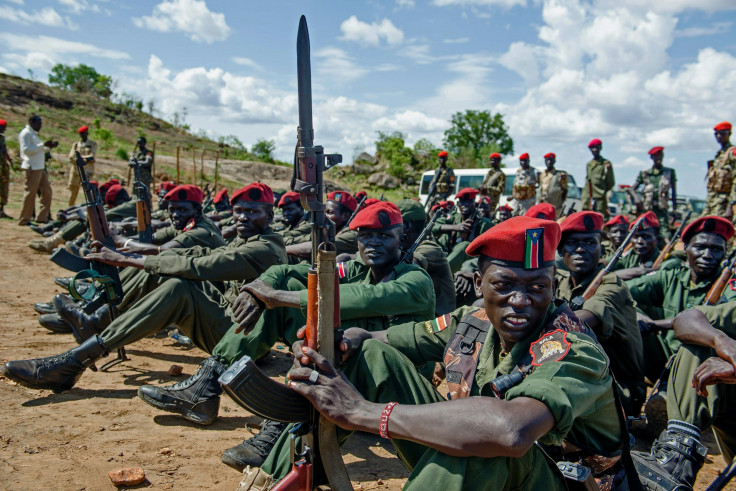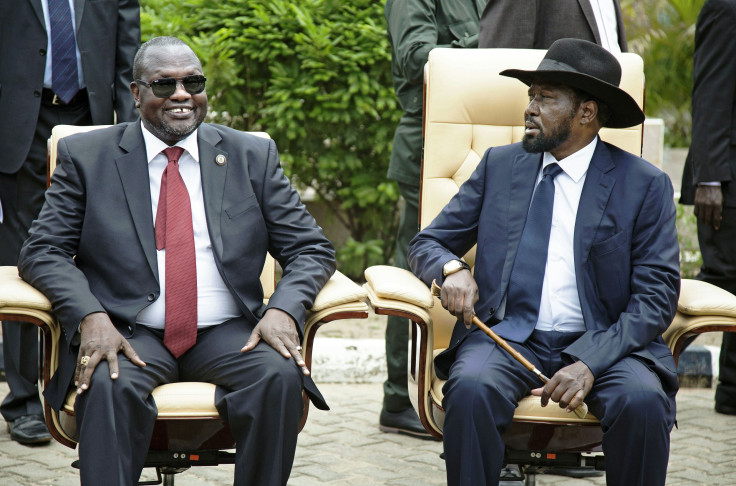South Sudan Violence Leaves Hundreds Dead, UN Calls For Peace As Fighting Continues

Hundreds, including several civilians and a Chinese United Nations peacekeeper, died in the clashes between soldiers loyal to President Salva Kiir Mayardit and troops loyal to First Vice President Riek Machar, which erupted last Thursday in the South Sudanese capital Juba. Chinese and Rwandan forces were also injured in the clashes.
The fighting between the two factions started late Thursday near the presidential compound but an apparent calm was restored Saturday, which was the country’s fifth independence anniversary. But, on Sunday, fighting resumed in southwest Juba near an army barracks and a United Nations base.
The U.N. Security Council reportedly held a closed-door meeting in New York Sunday to discuss the situation in South Sudan and strongly condemned the violence. In a statement, the council expressed “particular shock and outrage at the attacks on U.N. compounds and protection of civilian sites in Juba.” The council urged the two factions to come together to prevent more harm to civilian lives.
The council added that “attacks against civilians and U.N. premises and personnel may constitute war crimes.” The council also called for transparent investigations into these crimes so that those involved “must be held accountable and could be potentially subject to sanctions.”
The United Nations Mission in South Sudan said Sunday that the violence had forced at least 1,000 internally displaced people to flee from the UNMISS protection of civilians site. “The heavy fighting downtown Juba has forced hundreds of civilians to seek protection at UNMISS’ Tomping base. Both UNMISS compounds in Juba have sustained impacts from small arms and heavy weapons fire,” the U.N. mission said in a statement.
UNMISS calls on leadership to restrain forces,engage in dialogue,find political solution to crisis-Full Statement: https://t.co/YYq7tyK1Eq
— UNMISS (@unmissmedia) July 10, 2016
U.N. Secretary-General Ban Ki-moon also issued a statement Sunday saying that he was “deeply frustrated” that despite the peace agreement signed in August between the two factions, fighting had resumed. “I strongly urge President Kiir and First Vice-President Riek Machar to do everything within their power to de-escalate the hostilities immediately. ... This senseless violence is unacceptable and has the potential of reversing the progress made so far in the peace process,” he said.
Meanwhile, the U.S. has begun evacuating non-emergency staff from its embassy in South Sudan. The U.S. State Department reportedly said that the security situation in Juba as of Sunday had seen a “sudden and serious deterioration” with clashes between government and opposition forces breaking out into “general fighting.”
Spokesman for the State Department, John Kirby, reportedly said, “The United States strongly condemns the latest outbreak of fighting in Juba today between forces aligned with President Salva Kiir Mayardit and those aligned with first vice-president Riek Machar Teny, including reports we have that civilian sites may have been attacked.”

A spokesman for Machar told the BBC Sunday that South Sudan was “back to war” but Information Minister Michael Makuei Lueth called reports of war as “dishonest.” Lueth added that the situation was under control and urged people to stay at home.
The violence reportedly began when a shootout between Kiir’s bodyguards and Machar’s men got out of hand. The two leaders met at the presidential palace the same day, and issued a call for calm. A tense Saturday passed by but heavy gunfire was reported Sunday near military barracks occupied by troops loyal to Machar.
South Sudan became the world’s newest country on July 9, 2011, after it gained independence from Sudan following a referendum that passed with a 98 percent vote. The country went into crisis in December 2013 when Kiir accused Machar, his former deputy whom he sacked earlier, of plotting a coup.
A civil war broke out with Kiir’s Dinka ethnic group targeting those from Machar’s Nuer ethnic group. Machar and his loyalists were forced to flee to the countryside. The war left at least 50,000 dead, more than 2 million displaced, and nearly 5 million people faced severe food shortages.
A peace agreement was signed in August and both leaders formed a new government two months ago. But, fighting still continues in many parts of the country.
© Copyright IBTimes 2024. All rights reserved.












